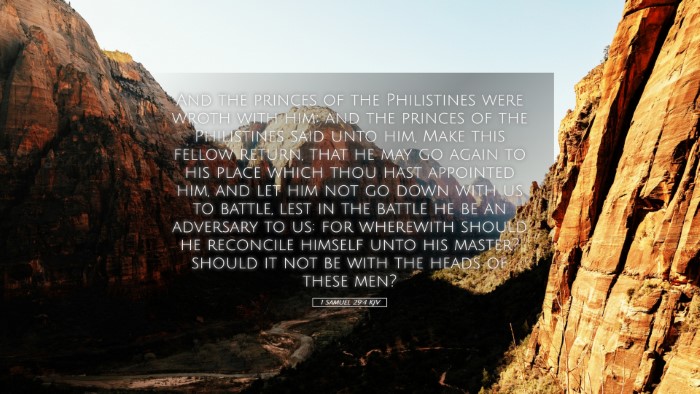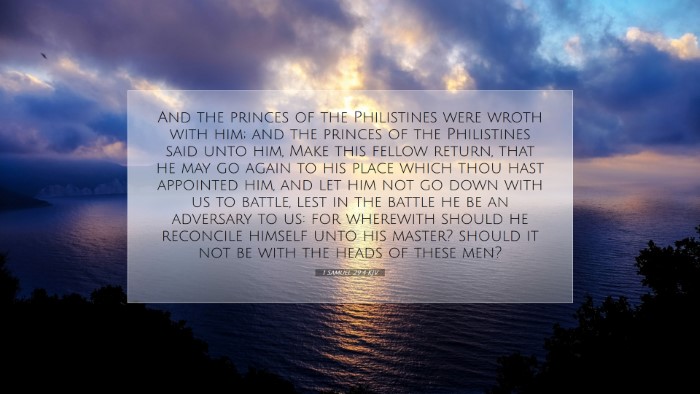Commentary on 1 Samuel 29:4
Verse Context: 1 Samuel 29:4 states, "But the princes of the Philistines were angry with him; and the princes of the Philistines said unto him, Make this fellow return, that he may go again to his place which thou hast appointed him, and let him not go down with us to battle, lest in the battle he be an adversary to us: for wherewith should he reconcile himself unto his master? should it not be with the heads of these men?"
Analysis and Insights
Historical Background
The narrative of 1 Samuel 29 provides critical insights into the geopolitical tensions of the time. David, anointed king of Israel, had sought refuge among the Philistines under Achish. This highlights a significant period in David's life, where he was not yet king, and the future of Israel was in jeopardy due to King Saul's pursuit of him.
The Characters Involved
- David: A man after God's own heart, finding himself in a precarious position, forced to align with Israel's perennial enemies.
- Achish: The Philistine king showing misplaced trust in David, believing him to be a formidable ally.
- The Princes of the Philistines: Representing the collective wisdom and strategy of the enemy, discerning the potential threat David posed if he were to engage against Israel.
Thematic Considerations
Divine Providence: The rejection of David by the Philistine princes exemplifies God's providential hand in guiding David away from compromise and positioning him for his future role as king. The awareness of these princes regarding David's loyalty to Saul demonstrates a profound understanding of his potential dual allegiance.
Human Perception vs Divine Purpose: The princes' decision reflects their political astuteness. Their refusal of David serves to protect their own interests, showing how worldly wisdom often seeks to mitigate perceived threats. This act unveils the tension between human perceptions and God's ultimate plans for His anointed.
Spiritual Lessons
- Importance of Righteous Alliances: David's time with the Philistines serves as a stark reminder of the necessity of choosing allies wisely. Just as David's identity was questioned, so too must believers be wary of aligning with those who might compromise their values.
- Divine Protection: The intervention of the princes can be interpreted as God's protective measure over David. He steers David away from conflict that could lead to moral or physical defeat, emphasizing its importance for leaders today.
- Understanding Adversity: David’s rejection by the Philistines can be seen as a form of divine preservation. It warns that sometimes rejection in life may be the pathway to divine safety and purpose.
Commentators' Insights
Matthew Henry: Henry remarks that the princes’ concerns stem from their understanding of David's loyalty and the potential reversal of their own fortunes. His description of David depicts him as a ‘man of war’ yet here he is seen as a foreigner, indicating how perceptions can shift based on circumstances.
Albert Barnes: Barnes emphasizes the crucial insight of the Philistines about David's capability of changing sides in battle. He cautions that in times of uncertainty, leaders must remain alert to those who might appear stable yet harbor divided loyalties.
Adam Clarke: Clarke outlines the implications of this rejection on David's future, linking it to the sovereignty of God. He articulates that the Philistines recognized returning to favor with Saul would likely involve bloody warfare, highlighting that God persisted in protecting David.
Conclusion
1 Samuel 29:4 serves as a potent reminder of the complexities of leadership, loyalty, and God's providential care. For pastors and theologians, this verse invites reflection on how divine sovereignty interweaves with human actions and decisions. It teaches us that God guides His servants away from paths of compromise, reminding them to seek righteousness and divine favor above the allure of political expediency.


